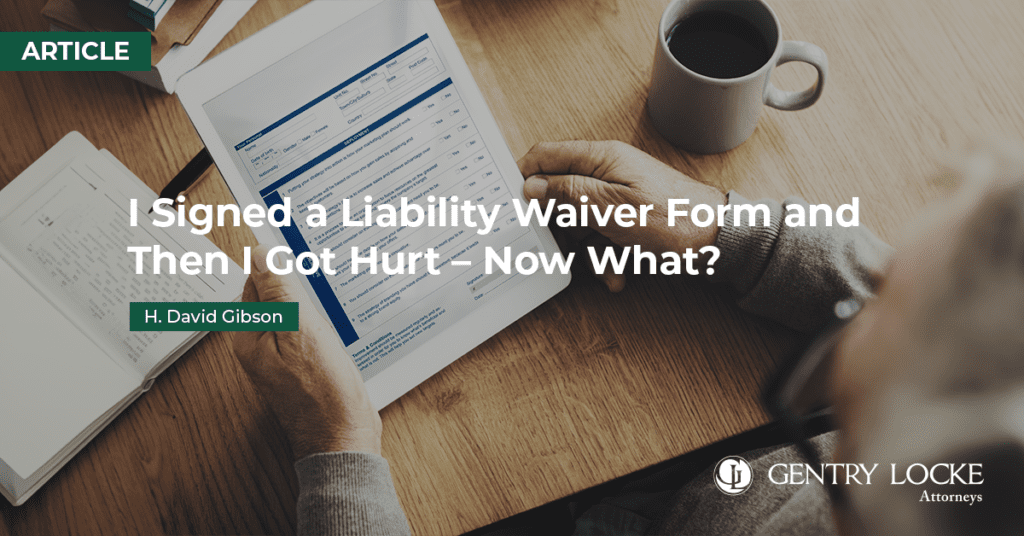I Signed a Liability Waiver Form and Then I Got Hurt – Now What?

Most of us have signed liability waiver forms before participating in certain activities. We encounter these forms in various circumstances and more often where companies engage in dangerous or high-risk activities. The following industries are more likely to require customers/visitors to sign liability waiver forms prior to engaging in the offered activities:
- Musical performances/concerts
- Zoos
- Athletic events
- Amusement parks
- Health and fitness clubs
- Wall climbing entities
- Sporting events
- School field trips
- Trampoline parks
- Outdoor park activities/adventures
- Water parks
A liability waiver form may also be referred to as a release, waiver, release agreement, or disclaimer, among other things. When you sign a liability waiver form you are essentially entering into a contract with the person/entity offering the activity. The intent of the contract is to prevent you from recovering damages if you are injured or killed while engaging in the activity.
A typical liability waiver form contains the following or similar language:
I AM VOLUNTARILY PARTICIPATING IN THE AFOREMENTIONED ACTIVITY AND I AM PARTICIPATING IN THE ACTIVITY ENTIRELY AT MY OWN RISK. I AM AWARE OF THE RISKS ASSOCIATED WITH PARTICIPATING IN THIS ACTIVITY, WHICH MAY INCLUDE, BUT ARE NOT LIMITED TO: PHYSICAL OR PSYCHOLOGICAL INJURY, PAIN, SUFFERING, ILLNESS, DISFIGUREMENT, TEMPORARY OR PERMANENT DISABILITY (INCLUDING PARALYSIS), ECONOMIC OR EMOTIONAL LOSS, AND DEATH. I UNDERSTAND THAT THESE INJURIES OR OUTCOMES MAY ARISE FROM MY OWN OR OTHERS’ NEGLIGENCE, CONDITIONS RELATED TO TRAVEL TO AND FROM THE ACTIVITY, OR FROM CONDITIONS AT THE ACTIVITY LOCATION(S). NONETHELESS, I ASSUME ALL RELATED RISKS, BOTH KNOWN AND UNKNOWN TO ME, OF MY PARTICIPATION IN THIS ACTIVITY.
These liability waiver forms are used in an effort to remove and/or limit the liability for the person or entity offering the services or activities. These forms may also serve to deter the injured participant from even making a claim. The inured party may believe that because a liability waiver form was signed, there can be no recovery.
While most states will enforce liability waiver forms, Virginia is in the minority, and generally speaking, will not enforce pre-injury liability release forms because they are against public policy.
This principle was initially established in 1890 in the case of Johnson’s Adm’x v. Richmond D.R. Co., 86 Va. 975 (1890). In that case, the Supreme Court of Virginia stated that:
[T]o uphold the [waiver] in question would be to hold that it was competent for one party to put the other parties to the contract at the mercy of its own misconduct, which can never be lawfully done where an enlightened system of jurisprudence prevails. Public policy forbids it, and contracts against public policy are void.
This principle was affirmed in the 1992 case of Hiett v. Blake Barcroft Community Ass’n, Inc., 244 Va. 191 (1992), where the Supreme Court of Virginia concluded that a pre-injury release provision signed by the plaintiff was prohibited by public policy and thus, void.
Even if the liability waiver form is void, defendants may attempt to use the form as evidence that the participant knew and understood the risks associated with participating in the activity. The defendant will argue that the plaintiff assumed the risk of his injury, which is a complete bar to recovery in a Virginia personal injury or a Virginia wrongful death action. Your lawyer should file a motion in limine to prevent the waiver form from being admissible for any purpose.
To conclude, generally speaking, pre-injury liability waiver forms are not enforceable in Virginia because they are against public policy. However, there are exceptions to this general rule, such as property damage waivers and indemnity agreements – where liability waivers may be upheld and enforced. If you were injured, or a loved one killed after signing a pre-injury liability release form, you should immediately contact personal injury attorneys in Virginia or a Virginia wrongful death attorney to assist you.





